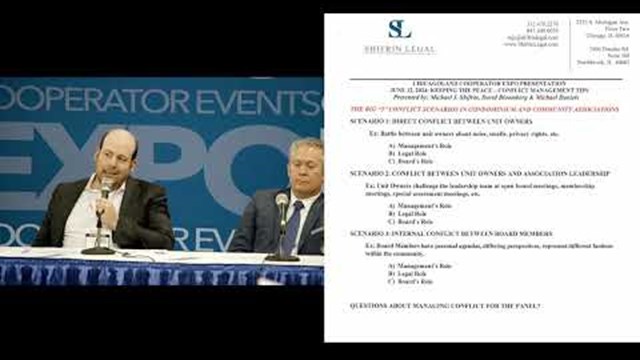
Sometimes in the heat of the moment, when disagreements are at their worst, the possibility of solving a problem without going to court seems remote at best. Arguments may have been brewing for days or weeks with each side becoming more and more entrenched in their own rationale and reasoning. Lines may have been drawn in the sand and threats of litigation hurled with reckless abandon.
“Condominium and homeowner association folks know that conflict is a pretty common occurrence,” says Jill S. Tanz of Chicago Mediation LLC. “And most of the time, conflicts that come up can be resolved either by the manager or the board negotiating informally with the groups that are in conflict. You can usually take care of it pretty simply,” with what's commonly referred to as alternative dispute resolution—either arbitration or mediation. The difference between the two, says Tanz, is that “arbitration is normally a binding process where both parties expect a decision. Mediation is non-binding and voluntary.”
Charles Castagna of the Clearwater, Florida-based firm Charles N. Castagna Mediation, Inc., adds that, “Arbitration is more of an adversarial process. The arbitrator makes a decision while the mediator does not. With mediation, the parties have an option to disagree and say no, I don’t think I want to do that.”
Arbitration can almost be thought of as a “mini trial,” says attorney Paul Milberg, a senior attorney with the statewide community association law firm of Katzman Garfinkel & Berger, with offices throughout Florida. In arbitration, the person leading the meeting “will determine who is right and who is wrong and the decision is binding,” Milberg says. “Mediation is more like a settlement conference. You have a certified mediator who listens to both sides and just tries to work it out so we don’t have to go to litigation.”
And most of the time, Castagna says, both sides “are able to come to an agreement.” Tanz outlined some of what can or cannot be disclosed in the process. “The process is usually controlled by the mediator but the results are controlled by the parties,” she explained. “The parties maintain the full right to decide whether or not they want to enter into an agreement for the solution that’s been worked out. Mediation is a confidential process: it’s confidential on two levels, first of all, the mediator cannot testify in court as to what goes on in the mediation. That’s protected by statute here in Illinois. On top of that the parties can agree that they will not reveal what went on in the mediation.”
Secondly, Tanz added the conversations with each side are private. The mediator’s greatest role, she says, is to sort out the dispute and find out the important issues to each side. In that way a resolution can be crafted to the satisfaction of both parties to the dispute, she says.
How Did We Get Here?
Just about anything can lead to the need for arbitration or mediation. “The one I see most often is covenant enforcement,” Milberg says. “Particularly nowadays, people don’t always realize their community is deed restricted. They go to the closing and get this huge book of legalese and the next thing they know they’ve broken one of the rules.” Problems also can arise with rules enforcement, if say, a board does not like the activities or actions of a resident and decides to pursue a covenant violation as a way of encouraging the departure of that individual from the community.
There are disputes, too, “over access to official records,” Milberg says. “If you’re paying your dues, you have rights to access that information.” If a board is reluctant to share certain details or if an individual unit owner decides to pursue access to those files with an unrelenting manner that makes everyone uncomfortable and defensive, that can lead to disagreements and problems.
Property manager Marcia Caruso of Caruso Management Group in Naperville, recently joined Tanz on a Chicagoland Cooperator-sponsored seminar panel with Attorney Steven D. Welhouse of The Sterling Law Office LLC. The Chicagoland Expo seminar examined what types of disputes usually arise in a condo setting that can be turned over for mediation.
Caruso cited the oft-repeated mantra of community association disputes: people, parking and pets. She said that managers are often on the front lines refereeing between the disputing parties. It’s important to rely on the condo’s rules and regulations. “We can’t have exceptions because then you have the lawyers involved,” she said. “There are conflicts that are going to exist when more than two people live together.”
Castagna agrees that violations of bylaws offer the most opportunity for trouble. Violations, he says, can range from “grass that’s too high to having a door painted blue that should have been a different shade of blue. It can get down to that level of minutiae but these issues are important to the boards.” There can be bigger issues, too, such as residents running home businesses out of their units in violation of the governing documents. In short, wherever it is possible to have two opinions or sides, it’s possible to have a potentially litigious disagreement. And the best way to avoid that is by pursuing arbitration or mediation, he says.
The seminar panelists emphasized one of the most important duties of the association board is to surround themselves with a good team: a property manager, CPA, banker and attorney.
How It Works
If you happen to be one of two or even three parties involved in a dispute and you are offered the chance at mediation, what can you expect from the process itself? First of all, it is a far more relaxed process than anything that would possibly take place in a court house. “Pre-suit and without a court order, the association’s attorney will contact a mediator and mediation will be scheduled at a mutually convenient time,” says Castagna. “At the mediator’s office, he or she will introduce the session by explaining the process and the idea of reaching an agreement in a confidential setting. The lawyers may make opening comments and then the parties will speak. We may put groups in different rooms to talk with the mediator, which is known as caucusing. The mediator cannot repeat things from one room to the other without the permission of that party.”
The idea of confidentiality is important to the mediation process. Information provided by one party outside of earshot of the other must be kept secret by the mediator. At the same time, should the argument continue onto court, none of the information gathered as a result of the mediation process can be used against either of the two parties. The exceptions do not often apply to co-op and condo disputes and only come into play in cases of criminal activity such as child or elder abuse or the threat of committing a crime. Short of criminal action or intent, everything said within the mediation process stays within those four walls.
The arbitration process may take a similar route except that one party may be judged to be in the wrong and the other in the right and whatever decision that arbitrator makes to rectify the situation is legally binding and must be followed.
Better Than Court
The benefits of alternative dispute resolution are many and the drawbacks negligible at best, especially for disputes originating in residential communities. “Mediation is ideally suited to these types of disputes,” says Tanz. People who take part in mediation “come to understand not just what they’re coming in and asking for but why they want it and what the alternatives might be. It’s a more forward looking approach.”
“There isn’t anything magical or formal or legal about it,” says Welhouse. “You can just agree to a mediation service, and there are a number of those in the city. You inform them about your dispute, who the parties are, what’s involved, and they can help to tailor what type of mediation you need, what materials you need to submit, what type of mediator you need to have, the form of the mediation and the venue.”
“It goes without saying however, that takes two to tango,” Welhouse continues. “If the other side doesn’t want to go to mediation or arbitration, or if they’re not interested in resolving your dispute, then you’re headed down the litigation path.”
Mediation is beneficial in another sense, too. It can help preserve the fabric of the community, something of vital importance when a disagreement flares between neighbors. “It helps preserve the peace within the community,” says Milberg. The process of mediation forces a re-evaluation of positions in many cases. “It’s easy to sit in a board meeting and decide to go after a neighbor without ever talking to that person,” Milberg says. But with mediation, “you have to be there in front of that neutral person and you have to stick up for your position with a person who is not your lawyer and who is not going to be telling you you’re right all the time. It’s almost like facing your accuser.”
“Mediators are trained to deal with emotions and in any conflict, there are emotions,” Tanz says. “Mediators can help work through those emotional issues to the point where maybe the parties can put their anger aside and think more logically about what a solution to the problem might be. So in general mediation is a low cost and quick process for dealing with disputes, the kind of disputes that would happen in a condominium between neighbors or between the management and the board or the management and the owners, usually would be taken care of in a half-day or a full day of mediation.”
The process can be a time-saver, concurs Milberg. “The court system is very crowded. And lawyers can be delayed with heavy caseloads, so that a matter that was of white-hot importance to the two parties in March may feel even more pressurized six months later or, alternatively, it may not even be an issue anymore. In the end, it ends up the same: time and resources wasted.”
Alternative dispute resolutions can be set up and enacted quickly. They also cost significantly less, which is of significant benefit to the individual unit owner who may not have the resources that a board and its team of attorneys do. Whereas legal fees for a trial can run into the thousands or even tens of thousands of dollars, mediation can be done for as little as a few hundred dollars split between the two parties. “It will save the individual unit owners money and the boards will save money, which is actually the entire community’s money. If it costs $10,000 to pursue a lawsuit on behalf of a 100-unit association, that’s $100 per resident.”
The time and money saved through alternative dispute resolution has proven so beneficial over the years, that some states, including Florida and New Jersey, have made it mandatory before a case can even head to court.
In Chicago, it’s not mandatory per se, but it may be required, according to Welhouse. Section 32 of the Illinois Condominium Property Act simply says that the declaration or bylaws may require mediation or arbitration of disputes in which the matter has no specific monetary value or a value of $10,000 or less but not anything to do with assessments or that arises out of a violation of the declaration or bylaws. “So what does that really mean?” asks Welhouse. “It says that your declaration or bylaws may require it. “
When trouble arises between boards and residents or even between neighbors, everyone involved may find it better to defer that instinct to sue. As litigious a society as we have become, it is vitally important for the health and financial well-being of all involved to remember that there are other ways to solve a problem. For less money, less time and far less stress, mediation and arbitration may offer the solution to even the most difficult disagreements. Although it involves compromise—a difficult pill for anyone who feels wronged to swallow—it can pay off in the long-run and preserve the peace among neighbors who most likely will still be seeing one another day in and day out.
“Mediation, I think, can really short circuit a lot of costs, a lot of headaches, a large expenditure of time,” says Welhouse. “It’s a good informal way for the parties to sit down and talk it out.”
Liz Lent is a freelance writer and a frequent contributor to The Chicagoland Cooperator. Managing Editor Debra A. Estock contributed to this article.









Comments
Leave a Comment